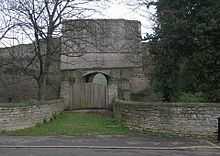Tickhill Castle

Tickhill Castle was a castle in Tickhill, on the Nottingham/Yorkshire West Riding border, England and a prominent stronghold during the reign of King John I of England.
Early history
The castle started as an 11th-century motte and bailey earthwork named Blythe Castle, built by Roger de Busli, a major landholder in the Domesday book holding 174 estates in Nottinghamshire, on land granted to him by William the Norman. The castle was deliberately built on the Nottingham/Yorkshire border, as Roger held authority in both. After a siege in 1102 Robert Bloet added a curtain wall to the rampart around the bailey; the first part of the castle to be built of stone. [1]
From 1151 to 1153, the castle was held by Ranulph de Gernon, 2nd Earl of Chester before his death after being poisoned. In 1180 construction began on an 11-sided or circular[2] keep on top of the motte by Henry II of England; it was completed in 1192 along with a stone bridge and a chapel constructed by Eleanor of Aquitaine.
Possession by John of England
In 1189, the land around Tickhill was granted to John of England by his brother Richard I of England, although the castle was withheld by Richard, along with Launceston, Rougemont Castle, Exeter, Gloucester and Nottingham, as Richard did not trust John's loyalty while he participated in the Third Crusade. His fears proved well founded after John seized the kingdom in 1191 from William Longchamp, Richard's chosen regent. Along with Windsor Castle, Tickhill was John's main stronghold to protect against a suspected invasion by Philip II of France.
Tickhill and Nottingham became John's last strongholds under the command of Robert de la Mare, and was besieged by Hugh de Puiset in 1194, with defenders holding out until they heard of the return of Richard to England. After gaining permission from Hugh they sent two knights to find out directly if Richard was indeed returned, and the knights immediately offered to restore the castle to Richard. Richard refused, saying he would only accept an unconditional surrender, which the knights negotiated upon their return, surrendering the castle to Hugh de Puiset in exchange for the defenders' lives. [3]
In 1321, the castle was unsuccessfully laid siege by Thomas, 2nd Earl of Lancaster during a rebellion against Edward II.
In 1372, it was granted to John of Gaunt by Edward III in exchange for the Earldom of Richmond. It remains a property of the Duchy of Lancaster to this day.
The English Civil War
By 1540, the castle was in poor repair; the lease was obtained in 1612 by Sir Ralph Hansby, who had the castle repaired and fortified. During the English Civil War the castle remained loyal to the crown, with Major Monckton set in charge of the castle after Sir Ralph's death in 1643. In 1644, John Lilburne and 200 dragoons from the Earl of Manchester's army marched to Tickhill, and accepted the castle's surrender on 26 July. The castle was razed in 1648 to prevent its use as a stronghold in the future. [1]
Today
After the Civil War, the Hansby family built a large house, which retains the fortified Norman gatehouse[4] and may incorporate parts of the old hall. The site of the bailey is now part of the gardens.[5] The castle is now a private residence and the monument is maintained by the Duchy of Lancaster, and opened to the public one day a year.[6]
References
- ↑ 1.0 1.1 David Hey, Medieval South Yorkshire
- ↑ Tickhill Castle
- ↑ W. Stubbs, ed. Chronica magistri Rogeri de Houedene
- ↑ The Tickhill Figures
- ↑ [Chibnall, M., 1976, ‘Robert of Bellême and the castle of Tickhill' in Droit Privé et Institutions Régionales: Etudes Historiques Offertes à Jean Yver Tickhill Castle].
- ↑ tickhill Castle
| ||||||||||||||||||||||||||||||||||